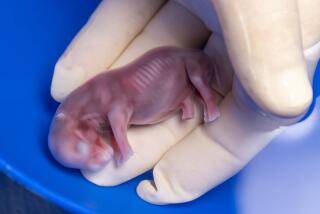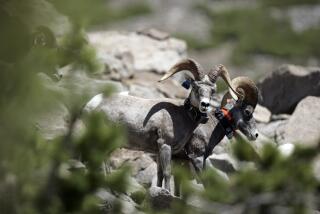Charging to the Rescue : Tony Fitzjohn Hopes a Trek to the Urban Jungle Will Save Africa’s Endangered Black Rhino
- Share via
Driving across the broad, paved, brightly lit avenues of Beverly Hills is disconcerting for a man used to the rugged, dusty terrain of northeastern Tanzania. But Tony Fitzjohn, an Englishman by birth, an African at heart, has ventured to the urban jungle for a purpose: to save the African black rhinoceros from extinction.
As director of the Mkomazi Game Reserve in Tanzania, Fitzjohn’s endeavor is a dangerous and expensive one. The park he runs will be used as the only rhino sanctuary in Tanzania, its rhinos imported from South Africa at a cost of $120,000 a pair because the indigenous species from Tanzania has been completely wiped out by years of poaching.
To protect the rhinos he will install solar-powered fencing around 30 square miles of grazing land, hire armed guards to patrol the area 24 hours a day and buy heavy surveillance equipment to fend off poachers armed with semiautomatic weapons and helicopters.
“It’s a lot of hard work and a lot of money we have to raise,” Fitzjohn says. “But it is something we must do because there just isn’t going to be another chance.”
In Los Angeles, Fitzjohn has assembled a group of well-connected supporters such as actress Ali MacGraw, photographer Herb Ritts, and Peter Morton, co-founder of the Hard Rock Cafe. With their help, Fitzjohn has been able to establish a successful fund-raising scheme. Thursday evening he will be joined by his friends and supporters in the second annual Jewels of Africa benefit, sponsored by 2 Rodeo in Beverly Hills. Last year’s event raised more than $50,000.
Neither glamour, vanity nor material wealth inspire Fitzjohn to mingle with the rich and famous. He is at ease in Africa where he has lived for almost three decades.
Born and raised in London, he headed for Africa as soon as he turned 21. “I was always ill at ease with people and had this disembodied feeling of not belonging where I was,” Fitzjohn, 50, says. “At the age of 7, I found a Tarzan book and I thought this was the thing that really made sense. Here was this man, out in the middle of nowhere, just talking to the animals.”
For a few years he drove delivery trucks in South Africa and then worked as an Outward Bound instructor in Kenya. Then he met George Adamson, who with his wife, Joy, worked to rehabilitate lions and return them to the wild, chronicled in the book and film “Born Free.”
“He was the sort of grandfather figure I’d always been looking for in my life,” says Fitzjohn, who was an adopted child. “He was the last of the great authentic people in Africa. He had an incredible compassion and understanding. He was one of the bravest, gutsiest men I’d ever met, but without being overtly macho about anything.”
Fitzjohn worked alongside Adamson rehabilitating lions in Kora, a national park in Kenya, until Adamson was ambushed and killed in 1989 by a band of men believed to be bandits.
It was then that Tanzanian government asked Fitzjohn to head the Mkomazi Project.
Nestled between Mt. Kilimanjaro and the Indian Ocean, the 1,500-square-mile Mkomazi Game Reserve was designated a national park in 1951. But the park was nearly destroyed and its animal population decimated after years of illegal hunting, poaching, burning of grasslands by local farmers and overgrazing.
Fitzjohn, along with a handful of rangers, set out to do what many considered impossible: rehabilitate an ecosystem and restore the wildlife.
Their work over the last six years has borne visible success. The once-abused vegetation is growing back to its natural state. Animals such as the elephant, which was down in number to only 11 in Mkomazi by the end of the 1980s, went up to nearly 1,000 in 1994. The wild dog, also hunted down to dangerously low numbers, has come back. Lions, hyenas, zebras and giraffes have also returned to the park.
But, with the rhino project, Fitzjohn is facing the most comprehensive task of his career.
In the late 1960s, 65,000 black rhinos roamed the African continent. Today there are fewer than 3,000. In 1968, there were 150 to 250 rhinos in Mkomazi. Today there are none.
The reason for these bleak numbers is poaching. Powdered rhino horns are used in many parts of Asia for medicinal purposes. In the Middle East, the horn is used as decoration for knife and sword handles. In Yemen, a single horn is worth $85,000.
Fitzjohn has bought 10 rhinos, originally from northeastern Africa, from the South African government. He estimates that setting up the rhino project, which he hopes to finish by the end of this year, will cost $1.2 million. Through the Tony Fitzjohn/George Adamson African Wildlife Preservation Trust, established in 1980, Fitzjohn has been able to fund his projects. There are four trusts, based in Los Angeles, London, Germany and Holland. They are all small operations, run on a volunteer basis by people who know Fitzjohn and believe in his work. The American Trust, made up of 10 board members, all but one based in Los Angeles, sponsors the Jewels of Africa event.
“He’s the real thing,” says board member MacGraw, who met Fitzjohn nearly 10 years ago in Kenya. “He has a passionate and lifelong commitment to preserving a natural order in East Africa. He is a dreamer on one level and a tremendous activist on another.”
“I was bowled over by this extraordinary character,” says Lord Antony Rufus-Isaacs, founder of the Los Angeles trust. He met Fitzjohn 15 years ago and admired his work with lions. “He seemed to be totally in control of himself and the animals. He was in complete peace with a lion that could kill him at any moment. There is something really special about somebody who can relate to animals in that way.”
Fitzjohn prefers the wild beauty of Africa to the planned architecture of Los Angeles. At times, he prefers the company of his animals to people. But, he is a practical man who understands money and politics are intertwined with the fate of his animals.
“I’ve come to realize that I can’t just be a good animal man,” Fitzjohn says. “I want to be a part of the decision-making process.
“If people in my generation don’t do this now, it is going to be too late and future generations are not going to see a rhino in Tanzania ever,” he says. “What right do we have to let these animals go because we can’t be bothered to make the effort to raise the money or build the fence or handle the politics to make something work? Whatever it takes, we just have to do this.”
More to Read
Sign up for Essential California
The most important California stories and recommendations in your inbox every morning.
You may occasionally receive promotional content from the Los Angeles Times.













